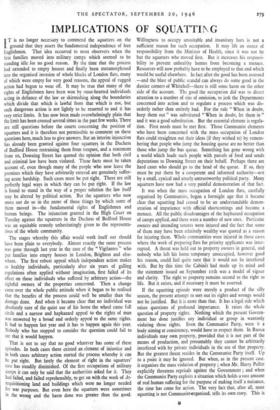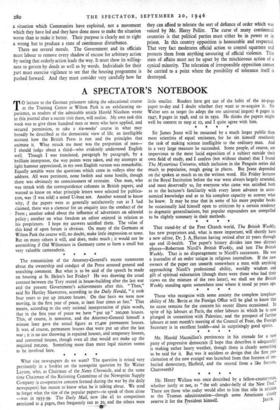IMPLICATIONS OF SQUATTING
T is no longer necessary to commend the squatters on the I ground that they assert the fundamental independence of free Englishmen. That idea occurred to most observers when the first families moved into military camps which seemed to be standing idle for no good reason. By the time that the process had extended to empty houses and finally been metamorphosed into the organised invasion of whole blocks of London flats, many of which were empty for very good reasons, the appeal of rugged action had begun to wear off. It may be true that many of the rights of Englishmen have been won by stout-hearted individuals acting in defiance of the law or skirmishing along the boundaries which divide that which is laivful from that which is not, but such dangerous action is not lightly to be resorted to and it has very strict limits. It has now been made overwhelmingly plain that the limit has been crossed several times in the past few weeks. There are still questions before the courts concerning the position of squatters and it is therefore not permissible to comment on these questions here, much less to give answers. But an interim injunction has already been granted against four squatters in the Duchess of Bedford House restraining them from trespass, and a statement from to, Downing Street has quoted the opinion that both civil and criminal law have been violated. These facts must be taken account of, even though many of the people- who now leave the premises which they have arbitrarily entered are genuinely 'suffer- ing acute hardship. Such cases must be put right. There are still perfectly legal ways in which they can be put right. If the law is found to stand in the way of a proper solution the law itself may be altered by political action. But the squatters who now move out do-so in the name of those things by which some of them moved in—the fundamental rights of Englishmen and human beings. The injunction granted in the High Court on Tuesday against the squatters in the Duchess of Bedford House was an equitable remedy unhesitatingly given to the representa- tives of the whole community.
The stages whereby this affair would work itself out should have been plain to everybody. Almost exactly the same process was gone through last year in the case of the " Vigilantes " who put families into empty houses in London, Brighton and else- where. The first robust appeal which independent action makes to healthy individuals, particularly after six years of galling regulations often applied without imagination, first failed of its effect on those individuals who suffered by arbitrary action—the rightful owners of the properties concerned. Then a change came over the whole public attitude when it began to be realised that the benefits of the process could well be smaller than the damage done. And when it became clear that no individual was absolutely sure of the quiet use of his home the wheel came full circle and a narrow and haphazard appeal to the rights of man was answered by a broad and orderly appeal to the same rights. It had to happen last year and it has to happen again this year. Nobody who has stopped to consider the question could fail to see that it would happen.
That is not to say that no good whatever has come of these episodes. In both cases there existed an element of injustice and in both cases arbitrary action started the process whereby it can be put right. But lately the element of right in the squatters' case has steadily diminished. Of the first occupations of military camps it can only be said that the authorities asked for it. They had failed, and failed reprehensibly, to get on with the work of de- requisitioning land and buildings which were no longer needed for war purposes. But even here the squatters were sometimes in the wrong and the harm done was greater than the good. Willingness to occupy unsuitable and insanitary huts is not a sufficient reason for such occupation. It may lift an ounce of responsibility from the Minister of Health, since it was not he but the squatters who moved first. But it increases his responsi- bility to prevent unhealthy homes from becoming a menace. Resources will now probably have to be employed to that end which would be useful elsewhere. In fact after the good has been assessed —and the blast of public scandal can always do some good in the dustier corners of Whitehall—there is still some harm on the other side of the account. The good the occupation did was to direct attention to a number of sins of omission, to jerk the Departments concerned into action and to regulate a process which was dis- orderly rather than entirely bad. For the rule " When in doubt, keep them out " was substituted " When in doubt, let them in " and it was a good substitution. But the essential element is regula- tion. First needs must be met first. Those Communist elements who have been concerned with the mass occupation of London flats could straighten out their ideas (if they wished to) by remem- bering that people who jump the housing queue are no better than those who jump the bus queue. Something has gone wrong with a world which loads such people with parcels of food and sends deputations to Downing Street on their behalf. Perhaps there are hard cases who should go to the head of the queue. If so, they must be put there by a competent and informed authority—not by a small, cynical and utterly untrustworthy political party. Many squatters have now had a very painful demonstration of that fact.
It was when the mass occupation of London flats, carefully organised by Communists, began a fortnight ago that it became clear that squatting had ceased to be an understandable demon- stration of impatience with official shortcomings and become a menace. All the public disadvantages of the haphazard occupation of camps applied, and there were a number of new ones. Particular owners and intending tenants were injured and the fact that some of them may have been relatively wealthy was quoted as a reason for injuring them. Whole communities were injured in those cases where the work of preparing flats for priority applicants was inter- rupted. A threat was held out to property owners in general, and nobody who left his home temporary unoccupied, however good his reason, could feel quite sure that it would not be interfered with. But by this time the Cabin& had made up its mind and the statement issued on September rith was a model of vigour and clarity. The right to property remains second to the right to life. But it exists, and if necessary it must be asserted.
If the squatting episode were merely a product of the silly season, the present attempt to sort out its rights and wrongs would not be justified. But it is more than that. It has a legal side which raises questions of profound importance. It raises the whole question of property rights. Nothing which the present Govern- ment has done justifies any individual or group in wantonly violating those rights. Even the Communist Party, were it a body aiming at consistency, would have to respect them. In Russia individuals may own property, provided that it is not part of the means of production, and presumably they cannot be arbitrarily interfered with by private individuals in the use of that property. But the greatest threat resides in the Communist Party itself. Up to a point it may be ignored. But when, as in the present case, it organises the mass violation of property ; when Mr. Harry Pollitt explicitly threatens reprisals against the Government ; and when the Communist Party exploits a situation which holds a vast amount of real human suffering for the purpose of making itself a nuisance, the time has come for action. The very fact that, after all, most squatting is not Communist-organised, tells its own story. This is a situation which Communists have exploited, not a movement which they have led and they have done more to make the situation worse than to make it better. Their purpose is clearly not to right a wrong but to produce a state of continuous disturbance.
There are several morals. The Government and its officials must labour to remove every shadow of excuse for arbitrary action by seeing that orderly action leads the way. It must show its willing- ness to govern by deeds as well as by words. Individuals for their part must exercise vigilance to see that the housing programme is pushed forward. And they must consider very carefully how far they can afford to tolerate the sort of defiance of order which was - voiced by Mr. Harry Pollitt. The curse of many continental countries is that political parties must either be in power or in prison. In this country opposition is honourable and respected. That very fact moderates official action to control squatters and protects them from anything savouring of official violence. This state of affairs must not be upset by the mischievous action of a cynical minority. The toleration of irresponsible opposition cannot be carried to a point where the possibility of tolerance itself is destroyed.



























 Previous page
Previous page